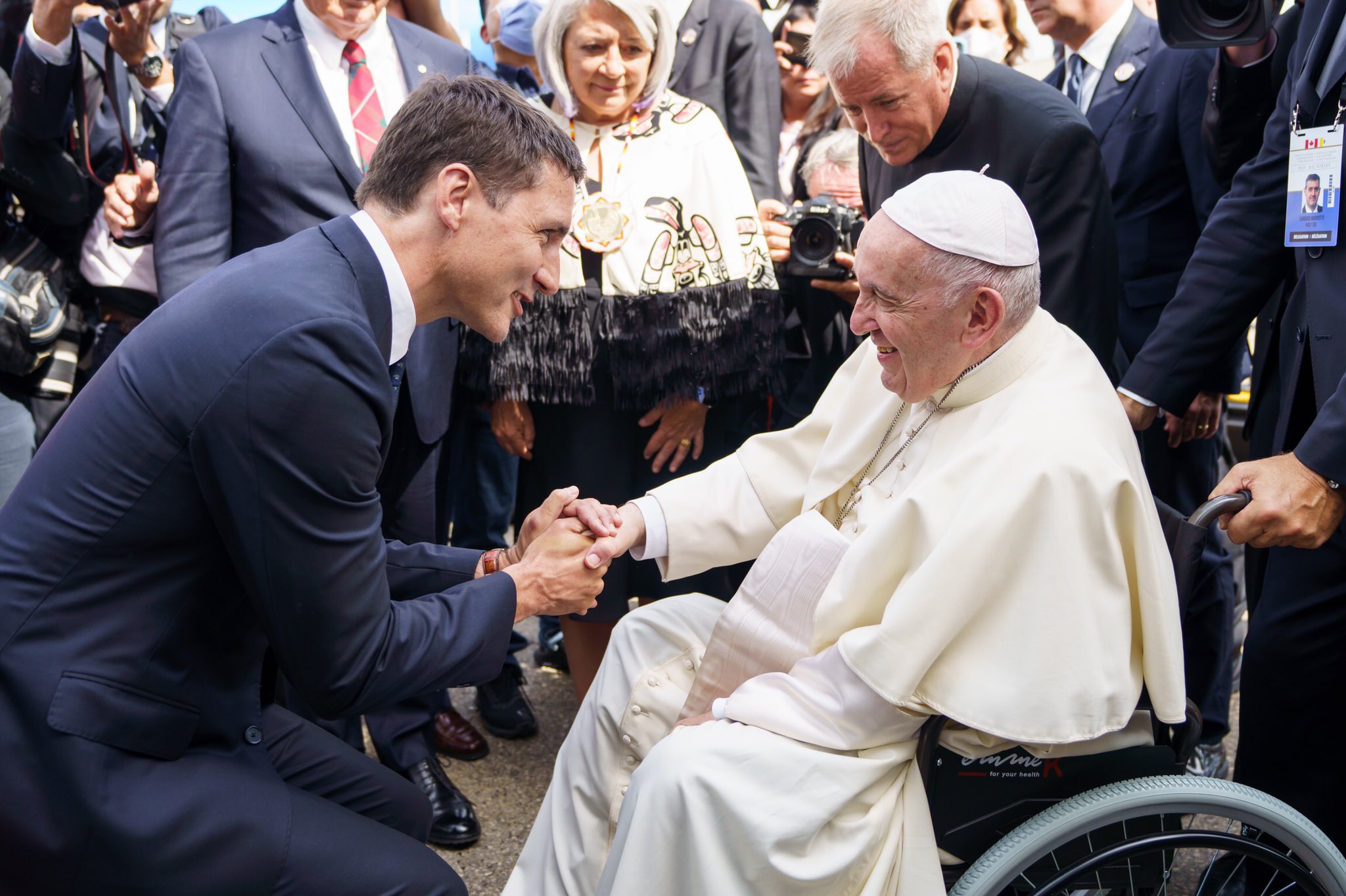Global pilgrimages by popes are usually choreographed to profile a larger-than-life religious figure, greeted by enormous crowds, and celebrating such festivals as World Youth Day which brings together thousands of wholesome teenagers.
The “penitential journey” of Pope Francis to Canada began Monday at Maskwacîs, a remote locale in Alberta, hosted by Indigenous Canadians. The pontiff recited the Lord’s Prayer but did not say Mass. Francis only briefly left his wheelchair but was on a mission to walk humbly before Aboriginal First Nations.
He was addressing what has become a shame for the Church and Canada, the longtime (1881–1996) taking of 150,000 children from their native schools and depositing them in residential schools.
The kids were beaten for speaking their native languages, subject to sexual abuse, with thousands succumbing to disease and despair.
Two-thirds of the schools were run by Roman Catholic religious orders.
The separation of kids from culture was “catastrophic,” said Pope Francis, aimed at the “cultural destruction of Indigenous peoples.”
He apologized at the Vatican in April but is making the journey to Canada despite age (eighty-five) and physical infirmity.
“I humbly beg forgiveness for the evil committed by so many Christians against the Indigenous peoples,” said Pope Francis, speaking at the site of what was once one of the largest residential schools in the country.
“I am so sorry,” he added. “I ask forgiveness, in particular, for the ways in which many members of the church and of religious communities cooperated, not least through their indifference, in projects of cultural destruction and forced assimilation permitted by the governments of that time, which culminated in the system of residential schools.”
With his statements, the Pope answered a 2015 recommendation by Canada’s Truth and Reconciliation Commission, which called for accountability and apology for the “spiritual, cultural, emotional, physical and sexual abuse of First Nations, Inuit and Metis children from Catholic-run residential schools.”
An apology for the Canadian government was delivered by then-Prime Minister Stephen Harper, a Conservative from Alberta.
“The treatment of children in Indian residential schools is a sad chapter in our history,” Harper told parliament. “Today we recognize that this policy of assimilation was wrong, caused great harm, and has no place in our country.”
There came, two years ago, a discovery that seared Canada’s national consciousness. The Kamloops Indian Residential School operated just outside the British Columbia city from 1881 to 1969, when it was taken over from the Church by the Canadian government and turned into a day school.
The building still stands. In June of 2021, anthropologist Sarah Bealieu surveyed the grounds with ground-penetrating radar, which detected the presence of an estimated 205 unmarked graves.
Assimilation was advertised as a strategy for bringing culture and faith to “uncivilized” children from isolated native villages.
It was widely accepted, school administrators were honored, priests and nuns posed with classes of newly scrubbed pupils.
In remarks Monday, Francis noted the reality of cultural genocide.
“What our Christian faith tells us is that this was a disastrous error, incompatible with the Gospel of Jesus Christ,” said the pontiff.
“It is painful to think of how the firm soil of values, language and culture that made up the authentic identities of your peoples was erased, and that you have continued to pay the price for this. In the face of this deplorable evil, the Church kneels before God and implores His forgiveness for the sins of her children.”
Witnessing his remarks was Canada’s Governor General Mary Simon, an Inuk born in northern Quebec and the first Indigenous person to hold the post as Queen Elizabeth’s ceremonial chief of state in Canada.
With banging drums and chants, and a parade of chiefs and elders, Indigenous peoples welcomed Pope Francis and even put a headdress on him. The Pope came to Canada bearing a pair of moccasins given him at a Vatican meeting in April with Aboriginal First Nations leaders. He returned them to Marie-Anne Day Walker Pelletier, a retire Okamese First Nations activist from Saskatchewan.
Survivors of the residential schools voiced gratitude for the Pope’s remarks but regrets that the Church did not speak up more forcefully and sooner. Scars remain that cannot be healed even in an apology delivered on Canadian soil.
Pope Francis attached great importance to his penitential journey. Due to ill health he has already canceled two trips abroad this summer.
But he is spending five days in Canada, seeking to heal decades of hurt.

